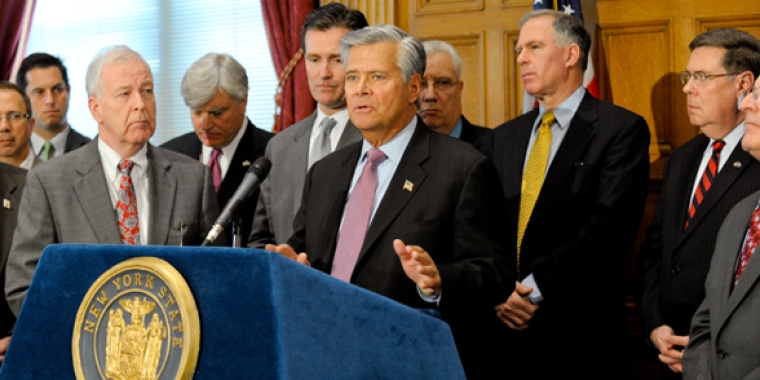
State Senate Passes Responsible Budget That Reduces Spending, Invests in New York’s Priorities and Includes No New Taxes
Dean G. Skelos
March 15, 2011
-
ISSUE:
- Budget

Spending Plan Will Serve As Roadmap to an on-time Budget
The New York State Senate today passed its budget resolution - - a fiscally sound plan that reduces spending, rejects tax increases and makes responsible investments in New York’s future.
The Senate budget largely mirrors the priorities outlined in Governor Cuomo’s Executive Budget and will serve as a real roadmap to the enactment of a responsible, on-time budget.
“Today’s passage of our Senate budget puts us on a path to strengthening New York this year and for the future. By controlling spending, reducing taxes and focusing on helping the private sector create jobs, Senate Republicans have shown that we’re listening to the calls of hard-working, middle-class New Yorkers and their families,” Senate Majority Leader Dean G. Skelos said.
The Senate budget closes a $10 billion budget deficit without raising taxes, and allows the PIT surcharge to sunset as scheduled so small businesses and others can get back to creating jobs for workers.
Coming in at approximately $132.5 billion, the Senate budget spends slightly less than the Executive Budget and stabilizes the State’s finances this year and in future years. Senate Republicans accept the Governor’s recommended caps on future Medicaid and education spending, which is in line with previous Senate Republican calls for passage of a State spending cap.
“The Senate’s budget will put our State back on sound financial footing by closing a $10 billion budget deficit without raising taxes. It gives small businesses the ability to begin creating jobs to get our economy back on track, and the caps on Medicaid and education spending, which mirrors Senate Republican calls for passage of an overall state spending cap, allow us to control spending going forward,” Senator John DeFrancisco, the Chair of the Senate Finance Committee, said.
The Senate budget makes minor school aid restorations ($280 million) which ensure greater equity for every region of the State. These minor restorations are mainly targeted to Upstate rural districts which are the most reliant on State aid and were most impacted by the Governor's budget.
The Senate accepts 95 percent of the $2.9 billion in reductions and reforms recommended of the Governor's Medicaid Redesign Team and authorizes counties to eliminate optional Medicaid services - - building on the Senate Republican’s commitment to reducing the cost of the Medicaid program to ease the burden on state and local taxpayers.
“Our priorities regarding the budget are the same priorities of the average Long Island family: jobs, the economy and tax relief. Our Senate budget addresses the crucial need to create jobs, redesign the Medicaid system and provide relief for taxpayers, while remaining largely in sync with the Governor’s priorities, which should lead to an on-time budget,” Senator Kemp Hannon, the Chair of the Senate Health Committee, said.
The Senate budget includes the Governor’s proposed Power for Jobs program bill to address the pressing need to help businesses create jobs, especially Upstate. The Senate passed the Governor’s program bill earlier this year.
"The people of New York are facing historic fiscal challenges, but the Senate Republicans are meeting them head-on. However, it doesn't stop at cutting spending. New York needs jobs, so we can grow our way out of these tough economic times. The Senate has already passed Power for Jobs, but we've included it in our Budget because it's that important. We need to get New York back on the right track. The hardworking taxpayers of New York are demanding that we close the deficit, cap spending, not raise taxes, and create jobs. The Senate Republicans share that sentiment and so does Governor Cuomo. I hope the Assembly shares it as well,” Deputy Majority Leader Thomas Libous said.
The Senate budget eliminates $296 million in cost shifts to local governments that could have led to property tax increases at the local level. While Senate Republicans are committed to delivering real and lasting mandate relief to local governments and school districts who are dealing with soaring costs which are sometimes out of their control, the State must also mitigate cost shifts that impact their budgets and local taxes.
The budget includes a modified version of LIFO supported by Mayor Bloomberg that continues our efforts to reach a three-way education reform solution so that every student has the best possible teacher leading his or her classroom.
On prisons, the Senate Budget includes alternative language to the Governor’s Executive Order to ensure that any closures are done in a way that minimizes the impact on the local community. It creates a Prison Efficiency Task Force that would recommend cost-saving strategies the Department of Correction and identify minimum and medium security facilities to close. The proposal sets forth criteria for the task force to consider, including marketability, value, economic impact, cost, workforce productivity and impact on unemployment.
Senate Republicans also advance various budget reforms, including GAAP accounting, performance budgeting and creation of an independent budget office, and remain committed to open, public conference committees to finalize an enacted budget before the April 1 deadline.